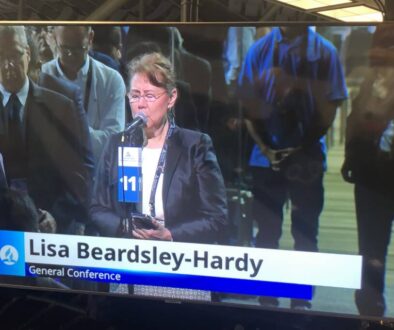Chief Adventist Doctor Calls for Compassion on Sexuality Issues
by Monte Sahlin
From Adventist News Network, March 21, 2014
The physician who leads health ministries for the Seventh-day Adventist denomination told the council studying sexuality this week that there is no clear model to understand why some individuals are homosexual, saying it is a “complex interplay of genetic and environmental factors.” Dr. Peter Landless, health ministries director for the denomination's General Conference, illustrated with both words and images the complexity of procreation and the genetic variances involved.
His address focused on a call for compassion to those in gay and lesbian relationships alongside a reaffirmation of the denomination’s stand on marriage as being between one man and one woman. He rebuked a remark he had overheard in a hallway at the meeting. “I’ve even heard it said at this conference that we’re talking about ‘those people,” he said. “We’re talking about fellow people on the journey of life.”
Landless is a native of South Africa, an internationally known cardiologist who previously worked at Johannesburg Hospital and served on the late President Nelson Mandela’s medical team. He is also an ordained minister with significant pastoral experience.
The physician began his address with a detailed overview of the procreation process and genetic variances that can occur. He gave an example of a child who was born intersexed, a condition known as Congenital Adrenal Hyperplasia, and how the child’s father rejected him. “If fathers and relatives reject children born with such rare conditions, how about the church?” Landless asked the council. “Should it be different?”
Homosexual men, he said, often have anatomical differences in their brains. Post mortem studies of homosexuals and heterosexuals have shown the differences, but it’s unclear whether the variation is causal or associated, Landless said, because the populations studied have been small. The differences show that many homosexual men have a larger superchiasmatic nucleas, which is involved in determining circadian rhythm, as well as larger anterior commissure, which communicates between the brain’s left and right hemispheres
Some researchers, Landless said are convinced there is a genetic component to homosexuality, with some searching for a “gay gene,” but there is no consensus on causes for homosexuality in either the medical literature or among professional psychologists. “The jury is definitely not resolved,” he said.
Homosexuals have slightly higher rates of increased non-communicable diseases, including hypertension and a higher cardiovascular age compared to their actual age. And lesbian women, Landless said, are 3.2 times more likely to die of breast cancer than heterosexual women.
“There are very significant health needs in the LGBT group,” Landless said. “We as Adventists are ideally equipped and situated to reach out to them. We as a church need to look to ourselves and understand, ‘Who is my neighbor?’”
Following Landless’ plenary session, several delegates said they appreciated his medical overview and his call for compassion. “He contrasted the physiological picture of what healthy looks like and also the full extent of what brokenness can look like,” said Pastor Audrey Andersson, executive secretary of the denomination’s Trans-European Division. “People can choose how they respond to others’ brokenness.”
Pastor Onaolapo Ajibade, executive secretary of the denomination’s West-Central Africa Division, said since there is no known cause of homosexuality, there is no “cure." And, “In the meantime we have to adopt a Christian approach. … Since we don’t know the cause, we have to be sympathetic.”
Before coming to the council, Ajibade said he questioned whether it was worth the effort and cost. “Originally I thought this summit was not needed, but having come here and having listened to all the presentations, I’m convinced beyond a reasonable doubt that it is worth it,” he said. “The church is making a spiritual step to equip us to be able to help our brothers and sisters.”
The Adventist News Network (ANN) is the official news service of the Seventh-day Adventist denomination. ANN has supplied Adventist Today with a series of six releases about the conference on sexuality attended March 17-20 by denominational officials from around the world. Adventist Today has published these with only light editing and made no attempt to confirm the reported information.



